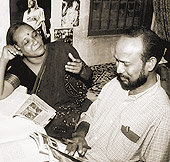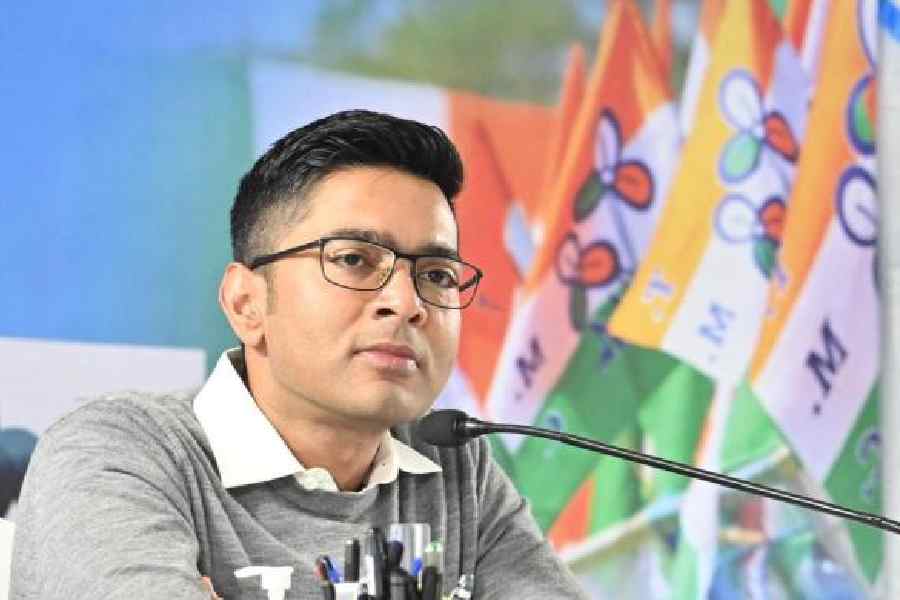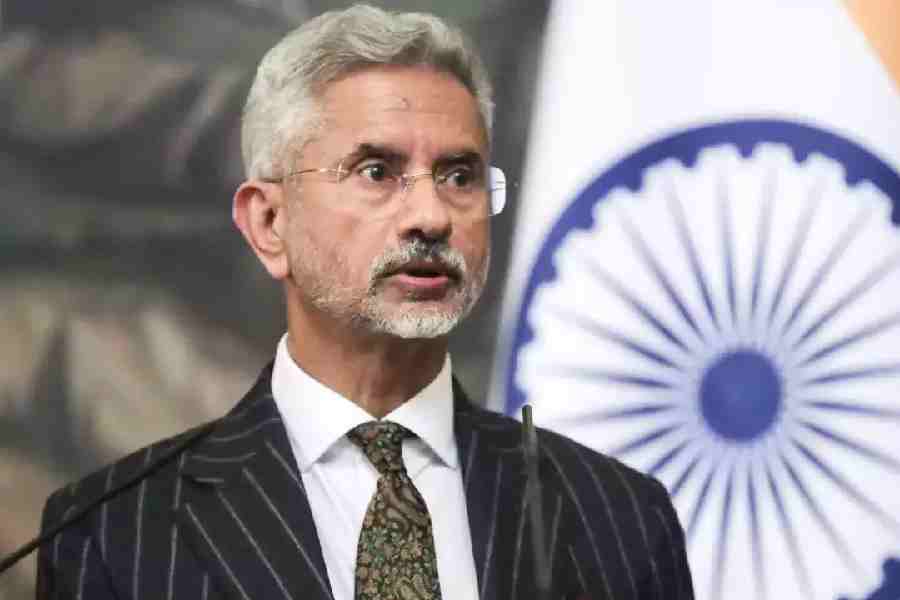 |
| Sameer Tanti’s ability to portray romance and grandeur in everyday life has made him a cult figure in modern Assamese poetry. Picture by S.H. Patgiri |
Sameer Tanti
Words stitched together form lines, lines design stanzas and stanzas build a poem. And thus, a poet is a builder, a reformer, a philosopher, a torch-bearer, who guides society in its march ahead. Sameer Tanti, the celebrated modern Assamese poet, speaks about his land, the people and their life in his poetry.
Born on February 6, 1955, at Behora tea estate in Karbi Anglong district of Assam, Tanti’s grandparents had migrated from Orissa to work in the tea gardens. “If Orissa holds my umbilical coil, then the lush green tea gardens of Behora are the roots of my poems,” reflects Tanti. First, he played with brush and colours. From the tender age of six he started expressing his emotions with lines and contours. “Painting is with what I started off and poetry is a natural corollary of that artistic urge within me,” points out Tanti.
He began his formal education under an Oriya guru. In 1983, he completed his post-graduation in English literature from Gauhati University. His academic career was a long struggle. “After learning Oriya for about a year, I was enrolled in Hindi High School in Behora. There, too, I remained only for two years,” he says. First it was Oriya, then Hindi and finally in the words of Ao Mur Aapunar Dekh, to the world of Assamese literature.
Scholarships and earnings from tuition classes helped him overcome the financial constraints. He passed matriculation with flying colours in 1974. Once, during his college days, he had also exhibited his paintings, which fetched him nearly Rs 2,000. “Encouragement and support from relatives and friends helped me to overcome all the barriers to fulfil my educational ambitions,” observes Tanti.
During his college days he started maintaining a dairy. His first poem appeared in the then popular literary magazine Nagorik in 1979. “I don’t remember the title of the poem, but it was based on untouchability,” recalls Tanti. This very first poem instantly struck a chord with the readers. From then, poem after poem have appeared in various national and regional dailies and magazines on a regular basis, making him a cult figure in modern Assamese poetry.
Tanti has seven poetry anthologies and two prose collections to his credit. Whether it is his first book Yuddhabhumir Kavita (1985) or the highly acclaimed Kadam Phular Rati (2001), every work showcases his versatility to deal with day-to-day life with a surrealistic vision. He brings to his work the sadness and oppression of the common man with great aplomb.
“Go, get the news across/ Don’t you tell them though/ That the men are all lost/ That with the roads/The courtyards too are lost/Don’t tell them of the firing at Kokrajhar/Or of the homes and fields mortgaged.”
African and Latin American poets, from Pablo Neruda to Seder Sanghor, have influenced him deeply. “I can easily relate to my surroundings (and connect) with theirs. There is a strong affinity between the African and Latin American countries with ours. They have a colonial past and the suffering and struggle attached with it are quite the same,” he muses. “Their hunger, poverty and the constant struggle symbolise everything that India is going through. And we can’t escape the reality, although it bites,” he says. “So there is no doubt that my work reflect some of their plight, which are no alien experiences for our land,” he explains.
Tanti appreciates the work of the next generation Assamese poets but is disappointed at their apathy towards several problems, from terrorism to corruption. “Romanticism can be expressed not only in man-woman intimacy. The sweat of a rickshawpuller also has the romance of human suffering to appease the boiling hunger in the belly,” he points out. He is currently working on a critical appraisal of 10 most-read young poets of Assam.
Tanti himself is open to critical study of his creative output. Till now Ananda Barmudoi, Arindam Barkotoki and Hiren Gohain have written on his work.
“Without critical analysis of any artistic endeavour, progression stagnates. So study of such work is vital for improvisation and enhancement of literary skills,” he reflects.
“India is a vast land with various languages and dialects, and translation of literary works is a must to diminish the geographical barriers and introduce people to the literary endeavours in various languages,” he says. Tanti and a few famous Gujarati and Oriya poets are translating each other’s works. Monalisa Jena, the poet who writes in English and Oriya,is currently translating Tanti’s Khadam Phular Rati into English.
Tanti, apart from engaging himself in literary and artistic pursuits, serves the department of tourism, Assam, as a tourist information officer. “My job offers me ample scope to travel to far-flung areas of the country. I am planning to come up with an anthology on my travelling experiences, titled Priyo Pariyotak, very soon,” he informs. Fifteen poems of this series have already come out in various dailies and journals. Exhibition of his paintings and graphics is also on the cards. “First I want to gain expertise in the department of graphics before bringing out my work for public view,” he ponders.
His wife, Lilibon Kalita, has provided constant support in all his endeavours. “We got married in 1980, when I had no job and she worked as a bank employee to support us,” he says. “Ours was not love at first sight, but love springing under the shade of understanding and constant companionship,” says the father of three.
Tanti has travelled a long way, from the pristine locale of Behora tea estate to conferences and seminars in different Indian cities.
Everywhere he carried with him the smell of his land. All his poems are about life and living. A life whether grand or common, anything and everything, influences him.
His words are enough to bring into focus the issues often unnoticed by others. And that is what makes him a class apart.











